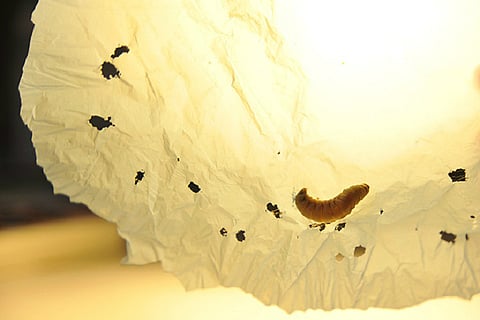

Among the many apocalyptic futures lying before us, one possibility is that humanity chokes on all the plastic bags it has produced. The plastic carry bags that get doled out by the hundreds in your local market may be handy, but they are an extremely heavy burden on the environment.
Each year, over a trillion plastic bags are used across the world. And these are extremely resistant to natural degradation, with some taking hundreds of years to decompose.
But scientists may now have a natural solution to tackle the global problem.
Research scientists from the Spanish National Research Council (CSIC), and Cambridge University, have discovered that wax worms (Galleria mellonella), larvae of a moth that usually feeds on honey and wax on beehives, can degrade plastic.
The worms, the researchers found, can biodegrade polyethylene, which is said to be the toughest plastic material that exists. Polyethylene is most commonly used to make shopping bags and for food packaging.
The researchers now hope to find the enzyme used by the worms to degrade the plastic so that it can be produced on an industrial scale.
A natural soultion
While there are some existing ways through which plastic can be degraded, the process is a time consuming one and involves the use of corrosive chemicals.
This is said to be the first time that a scientific team has found a natural solution that can degrade plastic.
"We have carried out many experiments to test the efficacy of these worms in biodegrading polyethylene. 100 wax worms are capable of biodegrading 92 milligrams of polyethylene in 12 hours, which really is very fast", CSIC scientist Federica Bertocchini, who works at the Institute of Biomedicine and Biotechnology of Cantabria in Spain, said in statement.
Federica Bertocchini with a wax worm; By César Hernández/CSIC Communication
Once the larval phase is over, the worms wrap themselves in their cocoons. The researchers also found that plastic bags can also degrade when simply kept in contact with the cocoon.
What makes the plastic degrade?
According to the research scientists, it could be because of the similar composition of beeswax and polyethylene.
"We still don’t know the details of how this biodegradation occurs, but there is a possibility that an enzyme is responsible. The next step is to detect, isolate, and produce this enzyme in vitro on an industrial scale. In this way, we can begin to successfully eliminate this highly resistant material", Bertocchini said.
Chance discovery
Bertocchini, who is also an amateur beekeeper, came across this phenomenon by accident, when she was cleaning honeycomb panels covered with worms in her house.
"I removed the worms, and put them in a plastic bag while I cleaned the panels. After finishing, I went back to the room where I had left the worms and I found that they were everywhere. They had escaped from the bag even though it had been closed and when I checked, I saw that the bag was full of holes. There was only one explanation: the worms had made the holes and had escaped. This project began there and then," she said.
The researchers have patented the discovery and the paper will be published in the next issue of Current Biology.